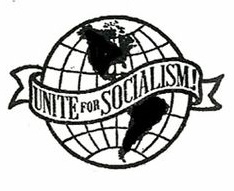We know that the cause of the oppression of the working class and of all the atrocities of capitalism such as war is that the world has been enslaved by a few capitalists who own all the wealth of the earth as their private property. The capitalist ownership of the means of production – this is the reason which explains the barbarity of the present order of things.
Some reformers propose depriving the rich of their possessions and justly and equally dividing it all among everybody, and then all will be well. They say everyone would be equal, and free from inequality, oppression and exploitation, thanks to this equal share-out and everybody will look after themselves and the domination over another will vanish.
But this is not the point of view of the Socialist Party. The Socialist Party considers that such equal sharing would lead to nothing good, and to no other result than a return to the old order. Firstly, there are quite a number of things which are impossible to divide. How, for instance, would you divide ta rail network?
But for argument’s sake let us imagine that miraculously a more or less equal division was attained of everything taken from the rich; even that would not lead to any desired result in the end. What is the meaning of a division? It means that instead of a few large owners there would spring up a large number of small ones. It means not the abolition of private ownership, but its dispersion over a larger area. In the place of large ownership, there would arise ownership on a small scale. But such a period we have already had in the past. We know very well that capitalism and large capitalists have developed out of the competition between one small owner and another. We would get the following result: part of them (and quite a considerable part) would, on the very next day, get rid of their share on some market or other, and their property would thus fall into the hands of wealthier owners; between the remaining ones a struggle would ensue for the buyers, and in this struggle, too, the wealthier ones would soon get the upper hand of the less well-to-do. The latter would soon be ruined and turn into wage-labourers, and their lucky rivals would amass fortunes, employing others to work for them, and thus be gradually transformed into capitalists. And so we should, in a very short time, return to the same order which we have just tried to dismantle and find ourselves once again before the old problem of capitalist exploitation.
In socialism, all the wealth belongs not to individuals or classes, but to society as a whole, which become it were, one great association; no one a master over another. Individuals in socialism do not benefit at one another’s expense. There are no rich here, no bosses and no top dogs; society is not divided into classes in which one rules over the other, no oppressor against the oppressed. There is no government to rule and there is no power of one over another. There is the administration of things only. Humanity is not divided up into hostile camps. The political barriers that divide nations are done away with. Separate fatherlands and rival motherlands are abolished. The whole of humanity, without distinction of nationality, is bound together in. all its parts and organised into one united whole. All peoples form one great world cooperative commonwealth.
The essential characteristics of socialism are:
1. Common ownership of the means of production and distribution of wealth. The elimination of the right of individuals or groups to dispose of the means of life. That right belongs to society as a whole. Hence, no exploitation of one group by another.
2. Economic and social planning on a world scale: This is made possible by the abolition of competition between capitalists, the anarchy of production, wars and militarism.
3. Production for use, not for profit: Substitution of the good for the commodity.
4. The abolition of the state: with socialism the state is unnecessary. Government in the form of armies, police, prisons, and property laws gives way to a system of administration, allocation, management and supervision of industry and agriculture by all the people, such as is necessary to maintain the world economy in smooth running order.
5. Disappearance of artificial differences and barriers fostered by capitalism: Nationalism, race hatred, religious bigotry, and caste are destroyed by international production and cooperation.
6. A tremendous increase in the productive capabilities of the human race: Human energy now necessarily spent in the class struggle or destroyed by war, unemployment and unproductive pursuits such as competition, advertising, warfare etc., will be set free. Increased productivity means a shorter work day, security and increased leisure. Society can then take from the individual according to their abilities and give to them according to their needs. The higher form of human organisation that existed in primitive societies with low productivity now is recreated on the highest level of productivity. On this foundation culture – the arts and sciences – can rise to undreamed heights.



No comments:
Post a Comment